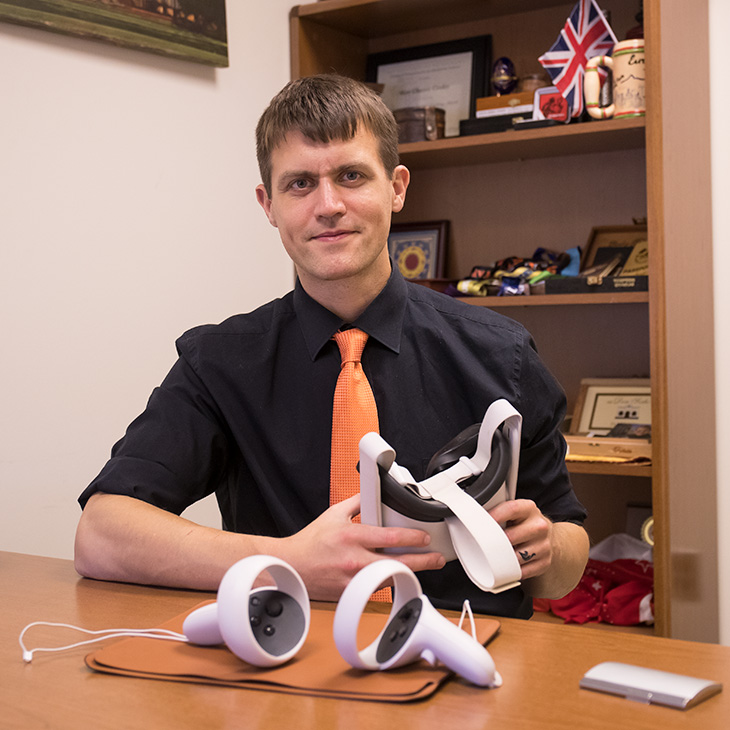
OSU introduces a new VR media literacy course for the Esports Certificate Program
Tuesday, September 27, 2022
Media Contact: Jordan Bishop | Editor, Department of Brand Management | 405-744-7193 | jordan.bishop@okstate.edu
Oklahoma State University’s School of Media and Strategic Communications (SMSC) has integrated a virtual reality media literacy course into the curriculum for the new Esports Certificate Program.
The course was introduced for the first time this fall semester.
The Esports Certificate Program aims to provide OSU students an introduction to the world of esports from a business and event-planning perspective. Professor Skye Cooley is taking an innovative approach to offer students in the program an opportunity to become involved with the evolving technology of VR.
“OSU is one of a few major media programs in the country that has an esports component,” Cooley said. “I think that we are, if not the first, certainly one of the first to offer essentially what is a fully virtual reality class.”
Students in the Esports Certificate Program are required to take three special topic classes in esports. The VR media literacy course is being offered as a special topic class.
The course is completely online and asynchronous in virtual reality. Students taking the course will be provided a VR headset to use for the semester through the SMSC.
The course is designed to accommodate all levels of VR proficiency. Students will learn everything from VR basics to more advanced components of VR. Assignments in the course include learning how to adjust the headset for comfort, building an avatar, creating a home screen, inviting friends over to virtual spaces, watching film and television in VR, touring worlds in the metaverse and creating a world in Horizon Worlds.
The metaverse is a network of 3D virtual worlds that can be accessed through a browser or headset. Meta Platforms Inc., formerly known as Facebook, created Meta Horizon Worlds as a VR platform in which users can explore virtual worlds and interact with one another.
Students learn how to work in a team through interactive gaming and multiplayer experiences. Throughout the semester, students start out by completing solo assignments before progressing to working and playing games as a team.
There are two options for the final project depending on the students’ capabilities.
“The class sort of splits in two trajectories at the tail end, where the students who are really solid gamers are challenged to get into Unreal Engine and design an actual game,” Cooley said. “And then, for the students that don't know any of that, we learn how to build our own world in Horizon Worlds.”
Through the Esports Certificate Program, students learn how to combine computing and gaming skills with media, advertising and brand image theories to open up new job opportunities.
“The students that take this certificate will be amongst the first to actually synergize this thinking about new job potentials and career paths,” Cooley said. “That’s the kind of thing that students who take this certificate will be able to do, they’ll have that idea of blending.”
Alejandro Cavazos is a student in the fall 2022 VR media literacy course. Cavazos explained that he had interest and experience in VR before taking the class.
“I’ve been following the growth of VR technology since the days of the Oculus Rift in 2013, but my first real introduction to VR was the PlayStation VR,” Cavazos said. “I spent a lot of time using that headset and I was contemplating getting an Oculus Quest for a long time, I just didn’t have the finances to purchase it. Luckily, this course kind of resolved that for me.”
The Oculus Rift, Oculus Quest and Playstation VR are all VR gaming headsets that allow the user to be completely immersed in a simulated VR environment.
Not only is the VR media literacy course a fun way for students to experience VR technology and gaming, but it can also prepare students for a career in VR.
“So with VR technology still in its infancy, I could definitely see this type of technology start to be incorporated in multiple different areas that have never previously used it,” Cavazos said. “I’m a strategic communications major looking to work in sales or marketing and I could totally see virtual reality becoming so common in our everyday lives that sales being done in a virtual space could be possible. And for marketing, I think it’s already a thing due to the fact that this new virtual space serves as another form of media to distribute a message.”
Careers within the esports field are quickly expanding in scope and availability. Students wanting to pursue a career in esports will benefit from having familiarity with the newest technology.
Story By: Hadley DeJarnette | hadley.dejarnette@okstate.edu
